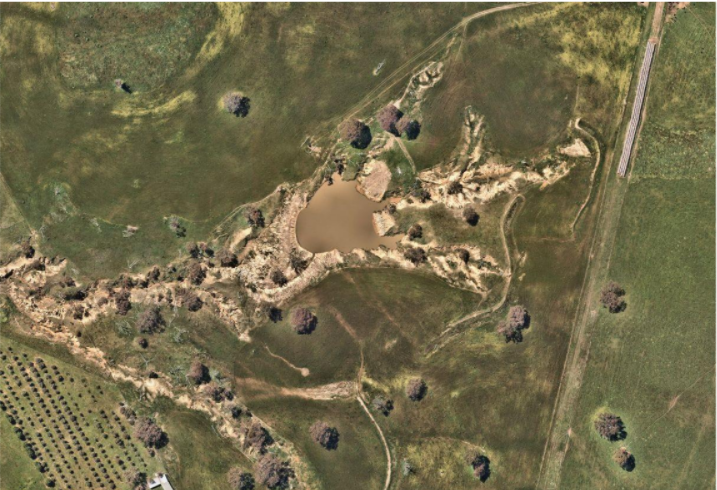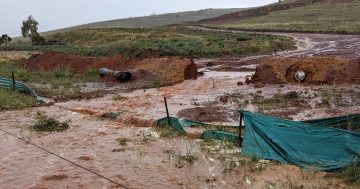
The dumping of ACT building waste has been an issue in Wallaroo for some time. Photo: Supplied.
Despite being in caretaker mode and just three days ahead of a local government election, tonight (1 December), Yass Valley Council staff will recommend approval of a development that will see 42,000 cubic metres of waste material imported to Brooklands Road in Wallaroo in 5600 trucks with dog trailers.
If the council chooses to adopt the recommendation, it would be going against its own Filling Policy, adopted in September, regarding the minimum information required to support a Development Application and classification of the works. Privately, council says the application was first made before the Filling Policy was implemented.
The news comes as an independent review conducted on this DA’s ‘Gully Rehabilitation Plan’ by a Director of the International Erosion Control Association, Andrew Macleod, declared there were significant shortcomings in how Yass Valley Council currently deals with fill dumpers. For this DA, in particular, it found there was potential for substantial risks resulting from the material’s impact on the surrounding water catchments, including the Murrumbidgee River.
For residents of Wallaroo, who have been dealing with these issues now for years, it’s the final straw.
“We’ve reached the point where this particular DA is of a scale and in a location that shouldn’t be approved,” said Wallaroo resident Paul Newall.
“Not only will it have a significant impact on locals, but local small businesses, the environment and just the amenity of the rural zoned area that we’re in. We’ve just got to take a stand.”
Construction companies from the ACT have been dumping their building waste in the surrounding NSW region for some time because it’s cheaper and NSW classifies waste differently.
VENM, or Virgin Excavated Natural Material, is a natural material that has been excavated or quarried from an area that is not contaminated with manufactured chemicals or process residues and does not contain sulfuric ores or soils. VENM is still defined by legislation as waste.
The ACT will only accept VENM at its waste management facilities, albeit at significant cost.
NSW will accept VENM, but also a lower classification called ENM, or Excavated Natural Material. It can also be certified as excavated natural material but is allowed to contain 2 per cent of other material and does not have to be taken directly from the ground so it can include stockpiled waste. The ACT does not accept ENM, hence the need to dump it across the border.
Mr Newall described waste dumping into NSW development sites as “greenwashing” under the term “erosion gully rehabilitation”.
Mr Macleod’s report reinforced this view. He found there was insufficient justification for filling the gullies for environmental reasons and doing so was inconsistent with the Local Land Services’ Gully Erosion Control Guide.
Mr Newall’s daughter, Jodie, said that while the certification tests for both VENM and ENM address acidic and sulphuric content, they do not test for sodic (dispersive) soil, and it is sodic soil that heightens the impact of erosion.
“Erosion is exacerbated when the soils are dispersive and sodic soils, by definition, have a tendency to disperse. Both the receiving soils in the Wallaroo area and the incoming soils from the ACT are known to be dispersive,” she said.
“It’s irrelevant whether the material coming in is VENM or ENM. If it is sodic or has other properties that give it a tendency to disperse, no test during VENM or ENM certification will identify this. Additional specific testing is required.
“The DA has no plans to identify or resolve receipt of sodic soils. The expert advice is that receiving dispersive soil into an area that is already susceptible to erosion is an environmental disaster waiting to happen. No one wants to see 63,000 tonnes of material washed into the Murrumbidgee.”
Six local businesses have delivered a plea to the nine councillors ahead of their vote.
“If approved with this quantity of fill, the project will have a significant detrimental impact on the appeal of the region over many years, way beyond the declared two-year duration, and will damage our reputation and business offering,” wrote the spokesperson for the group.
“We implore you not to approve DA200091. If not rejected outright, at the very least, it should be deferred so that the new council, who will have to deal with the consequences, have the opportunity to be involved.”
Original Article published by Max O’Driscoll on Riotact.








